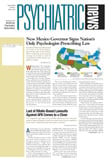“But” was the word that resounded most frequently at the March 13 meeting of the House Energy and Commerce Committee Subcommittee on Health and Environment about the Bush administration’s health care proposals.
Rep. Sherrod Brown (D-Ohio) said to Health and Human Services (HHS) Secretary Tommy G. Thompson, “[Y]ou rightly invest generously in the National Institutes of Health [NIH], which supports research into new medical treatments, but you cut funding for the Agency for Health Research and Quality [AHRQ], which plays a critical role in communicating that research to the medical community and the public.”
Many committee members commended the proposed doubling of the NIH budget over five years and the increase of 6.3 percent in the HHS budget for Fiscal 2003 over the previous year. The largest percentage increase will be in funding for bioterrorism efforts. The figure for Fiscal 2003 in the HHS budget is $4.3 billion, a 45 percent increase over Fiscal 2002.
The members followed their praise, however, with concerns about inadequate funding for prescription drugs for the elderly, the use of tax credits to help the uninsured (see
page 4), and cuts to programs such as health professions grants (72 percent decrease) and rural health programs (42 percent decrease).
Even Republicans joined in on the attack. Rep. Greg Ganske (R-Iowa) said that Iowa hospitals were “hemorrhaging red ink” because of inadequate Medicare and Medicaid reimbursement for rural hospitals. He asked, “What good will it do for seniors in rural areas to have prescription drugs if there are no hospitals to serve them?”
Rep. Charles Norwood (R-Ga.) argued against the administration’s position that any increases in the health budget must be “budget neutral,” that is, offset by equivalent cuts in other areas of that budget. He expressed concern about the exodus of physicians from the Medicare system because of recent reimbursement cuts and suggested that the administration’s entire budget be searched for potential savings.
Prescription Drugs for Medicare
The administration’s proposals for prescription-drug coverage came under the heaviest attack. President Bush proposed spending $77 billion over 10 years to provide prescription drugs to low-income Medicare beneficiaries and $116 billion for unspecified Medicare modernization efforts, including additional prescription-drug coverage. A discount-card program for prescription drugs would offer Medicare-endorsed discount cards to assist beneficiaries with prescription-drug costs.
Model Medicaid drug waivers would allow states to offer drug coverage through Medicaid to individuals with incomes up to 200 percent of the federal poverty level. States receiving drug waivers would be required to do so at no additional cost to the federal government. States could also use waivers to provide drug benefits through Medicare-endorsed prescription-drug cards or use cost-control methods such as prior authorization.
Rep. Lois Capps (D-Calif.) called the amount of federal money proposed for drug coverage “woefully inadequate.” Brown charged that the drug proposal represented an effort to “go after” entitlements.
He said, “You are using this budget to means-test Medicare and provide drug coverage outside the Medicare benefits package, knowing full well that Medicare’s future depends on its ability to deliver comprehensive health coverage and its availability to all seniors, regardless of income.”
The most recent projections from the Congressional Budget Office show that national spending on prescription drugs for Medicare beneficiaries over the next 10 years will reach $1.8 trillion, about 10 times more than what Bush proposed for Medicare reform and a drug benefit.
Medicare Managed Care
Bush proposed $4.1 billion over three years to increase the rates paid to insurance companies that participate in Medicare+Choice, the Medicare managed care program. Companies have been pulling out of the program, leading to decreasing benefits and increasing copayments (Psychiatric News, December 21, 2001; January 4).
In response to a request for an assurance that an influx of funds to the program would prevent further erosion in the benefits offered by the companies and in their participation, Thompson replied that although such an assurance is legally impossible, the companies were exiting because they could not afford to participate at current reimbursement rates.
Thompson said, “One hundred and ninety billion dollars [the total of all increases in Medicare spending over 10 years] is a giant first step. Let’s begin.”
He added that in response to a February letter from Reps. William Thomas (R-Calif.) and Nancy Johnson (R-Conn.), HHS was developing a list of recommendations about budget items that could be cut to offset proposed increases in physician reimbursement under Medicare.
As of press time, the House had passed a budget resolution that would allocate $350 billion over 10 years for a Medicare drug benefit and a Medicare reform proposal, and the Senate was expected to pass a resolution with a larger Medicare figure.
“The President’s Fiscal Year 2003 Budget: An Overview of Health Programs” is posted on the Web at www.kff.org/content/2002/4041/. ▪
